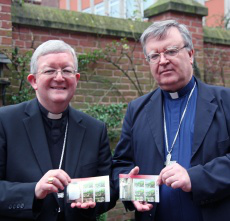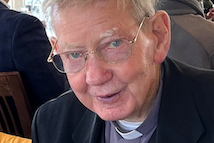Bishop Kenney: 'Pope's Holy Land pleas fall on deaf ears'

Archbishop Longley and Bishop Kenney with the commemorative stamps on Friday. Picture by Peter Jennings
The impassioned pleas made by Pope Benedict XVI during his Pastoral Visit to the Holy Land, 2009, have largely fallen on deaf ears.
That was the verdict of Bishop William Kenney, CP, a member of the 2011 Holy Land Co-ordination of Episcopal Conferences in Support of the Church of the Holy Land, less than 24 hours after his return on Thursday 13 January.
“While there has been some improvement in the situation for the people of the Holy Land, it is quite clear that the impassioned pleas made on their behalf by Pope Benedict during his Apostolic Journey in May 2009, have fallen on deaf ears.
“Many of the priests and religious sisters are still finding it very difficult to travel to and from Jerusalem and within the West Bank.”
“It is difficult to understand how priests and nuns, even though they come from other Arab countries, are a security threat,” Bishop Kenney, an Auxiliary Bishop of Birmingham said during an exclusive interview at Archbishop’s House, Birmingham.
“It has to be clearly stated that the security wall, still being built by the Israeli Authorities causes many pastoral problems on a daily basis, stressed Bishop Kenney, who has now been part of the Holy Land Co-Ordination on ten of its eleven annual visits since it was mandated by the Holy See. Bishop Kenney did not go in January 2003.
“During our visit in January 2010 I visited a convent which has a nursery school where the security wall goes along the boundaries of the convent. At the time the Israeli authorities allowed very young children – three, four and five year-olds across and into school each day.
“The Israeli authorities have now stopped this movement of very young children across the security wall. These little children, if they attend the nursery, must now be driven to a check point some distance away. They must get off a bus, walk through the check point and then get on another bus to the nursery. Many parents are not willing to subject their very young children to this kind of harassment and the risks involved,” said Bishop Kenney.
During the Holy Land Co-ordination visit, 10-13 January 2011, Bishop Kenney, spoke to a nun who is in charge of a catechetical centre in Jerusalem. She explained that she had to teach the same course three times because of the severe travel restrictions for most Palestinians.
“Instead of being allowed to teach all her catechists in Jerusalem the nun told me that she had to give the same course, once in Jerusalem, once in the West Bank and once in Bethlehem because the catechists have great difficulty in entering Jerusalem,” said Bishop Kenney.
Asked what hope there was in the Holy Land today, Bishop Kenney paused for a moment and replied: “The hope, as always, is in people.”
“During a meeting with more than 60 religious sisters on 12 January I was lifted by their enthusiasm and passion for spreading the Gospel of Jesus Christ despite all the difficulties they encounter on a daily basis.”
“Also I was given hope and inspiration by my brother bishops from the Holy Land because of their perseverance and unfailing courtesy to those of us who visit them.”
Bishop William Kenney made clear that an even greater source of hope was in meeting ordinary Catholics who live in the Holy Land.
“A few days ago I met a group of Catholics in Jericho who told me something about themselves and how they lived harmoniously together with their Muslim sisters and brothers. Despite the many difficulties they encounter every day these Catholics remain faithful to the Gospel,” said Bishop Kenney.
During the visit the Holy Land Co-ordination Group had the opportunity to meet with the Palestinian Prime Minister, Dr Salam Fayyad in Ramallah, on 11 January.
Asked about this meeting Bishop Kenney said: “The Palestinian Prime Minister is a very impressive man. He gave us the good news that during 2009 more Palestinians actually arrived in the country than left. He also expressed his satisfaction at the number of pilgrims who came to Bethlehem during Christmas 2010.”
He added: “I would encourage pilgrims who visit Rome this year to remember their sisters and brothers in the Holy Land. In particular I would ask them to pray at the tomb of St Peter in St Peter’s Basilica.
“As a reminder of the Holy Land, pilgrims might also consider going to the Vatican Post Office to buy the special postage stamp issued by the Holy See last year to mark the Apostolic Journey of the Holy Father to the Holy Land in May 2009.”
The joint Holy See – Israel stamps were released as single postage stamps and in a special souvenir sheet of four stamps on 15 November 2010. The stamps show Olive Trees in the Garden of Gethsemane with the Church of All Nations in the background.
Bishop William Kenney is scheduled to lead the fifth Archdiocese of Birmingham Pilgrimage to the Holy Land from 27 September to 6 October 2011.


















